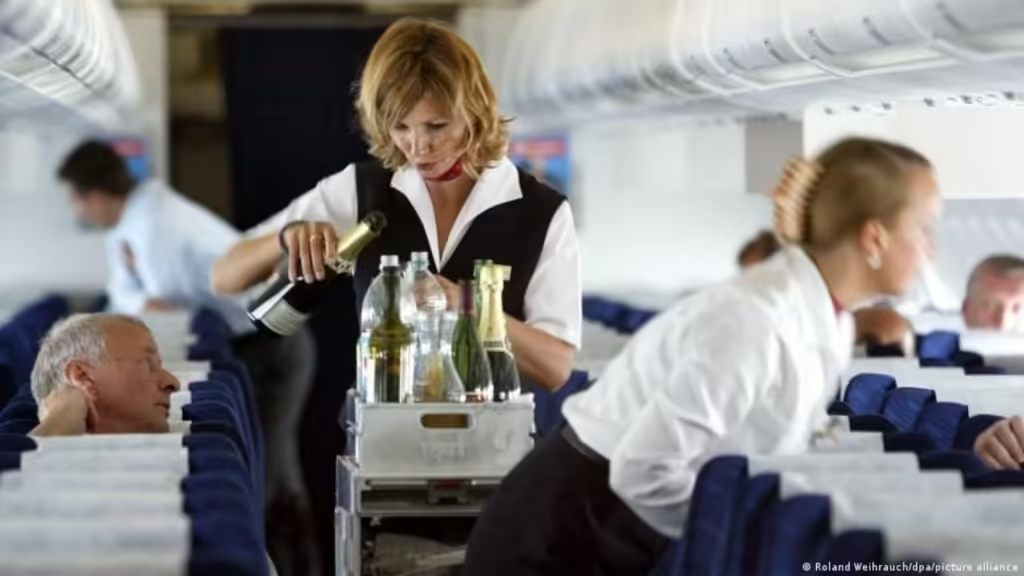Buckle up, jet-setters! It’s time to rethink that in-flight cocktail as new research takes off on the potential impact of alcohol consumption at cruising altitude. Soaring through the clouds might be a dreamy escape, but could your heart health be paying the price for those tempting tipples? Let’s dive into this high-flying debate and uncover why hitting the drinks cart on a plane might not be as smooth sailing as it seems.
The potential risks of consuming alcohol on a plane
When it comes to consuming alcohol on a plane, there are potential risks that travellers should be aware of. The altitude at which planes fly can affect how the body processes alcohol, leading to quicker intoxication and dehydration. This combination can put a strain on the heart and increase the risk of cardiovascular issues during the flight.
Furthermore, factors like cabin pressure and limited oxygen levels in aeroplanes can exacerbate the effects of alcohol on the body. This can impact blood circulation and oxygen delivery to vital organs, including the heart. It’s important to consider these physiological changes when deciding whether or not to drink alcohol while flying.
Being mindful of your alcohol intake onboard is crucial for maintaining good heart health during air travel. Opting for non-alcoholic beverages or staying hydrated with water can help mitigate some of the risks associated with drinking on a plane. Prioritizing your well-being while in transit is essential for a safe and comfortable journey ahead.
Possible factors contributing to these risks
When it comes to drinking alcohol on a plane, there are several factors that can contribute to the potential risks for heart health. One major factor is the altitude at which the plane is flying. As the altitude increases, so does the impact of alcohol on your body. The combination of high altitude and dehydration from flying can intensify the effects of alcohol, putting extra strain on your heart.
Moreover, reduced oxygen levels in an aeroplane cabin can also affect how your body metabolizes alcohol. This means that even a small amount of alcohol consumed while flying can have a more significant impact than when you’re on the ground. Additionally, factors like lack of sleep, jet lag, and overall travel stress can further exacerbate any negative effects that drinking alcohol may have on your cardiovascular system.
Considering these various elements at play during air travel, it’s important to be mindful of how consuming alcohol could potentially impact your heart health while flying.
Alternatives to drinking alcohol on a plane
When it comes to alternatives to drinking alcohol on a plane, there are plenty of options to consider. One great alternative is staying hydrated by drinking water throughout the flight. This not only helps you avoid dehydration at high altitudes but also supports your overall health.
Another option is bringing your own herbal tea bags or caffeine-free beverages onboard. Enjoying a soothing cup of herbal tea can be a relaxing way to unwind during your flight without the negative effects of alcohol.
If you’re looking for something with a little more flavour, why not try some fruit-infused water? Simply slice up some fresh fruits like strawberries or cucumbers and let them steep in your bottle of water for a refreshing and healthy drink.
Engaging in activities like reading, listening to music, or watching movies can help distract you from the temptation of reaching for that alcoholic beverage. Remember, there are many ways to enjoy your flight without compromising your heart health!
Tips for maintaining heart health while traveling
Travelling can be exciting, but it’s essential to prioritize your heart health while on the go. Stay hydrated by drinking plenty of water throughout your flight. Dehydration can strain your heart, so avoid excessive alcohol and caffeine consumption.
Incorporate light physical activity into your travel routine. Take short walks during layovers or stretch in your seat to keep blood circulation flowing smoothly. Pack healthy snacks like nuts, fruits, and granola bars to avoid relying on airport fast food options high in sodium and unhealthy fats.
Try to maintain a regular sleep schedule as much as possible by adjusting to the time zone of your destination gradually. Prioritize relaxation and stress management techniques such as deep breathing exercises or meditation to keep your heart rate steady amidst the hustle of travelling.
Consider consulting with a healthcare provider before embarking on long journeys, especially if you have pre-existing heart conditions. Carry any necessary medications in your carry-on luggage and be prepared for unexpected health concerns with travel insurance.
Conclusion and recommendations for future air travel behaviour
It is essential to be mindful of the potential risks associated with consuming alcohol on a plane, especially concerning heart health. Opting for alternatives like water or herbal teas can help you stay hydrated and reduce the strain on your cardiovascular system during flights. Additionally, practising healthy habits such as moving around the cabin regularly, stretching, and deep breathing exercises can further support your heart health while travelling.
By being proactive and making informed choices about what you consume and how you care for your body during air travel, you can help mitigate any negative impacts on your heart health. Remember that taking care of yourself while flying is crucial for arriving at your destination feeling refreshed and ready to enjoy your trip to the fullest. Safe travels!
To know more, go to www.qawire.com

